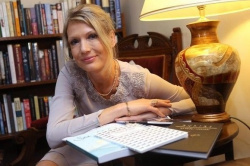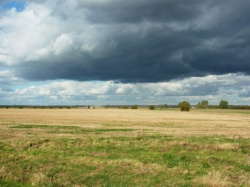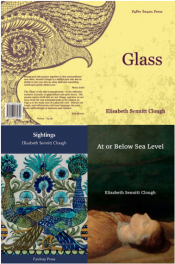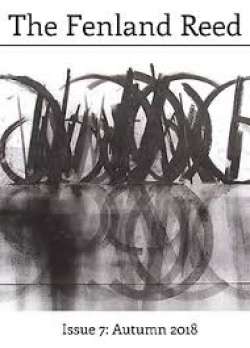Poetry, place and identity: Elisabeth Sennitt Clough

Some politicians are inescapably linked to things they said, often without thinking, or because they were poorly advised. Or plain stupid. JFK could never shake off the ‘ich bin ein Berliner’ thing, however well-meant it was that he thought he was saying. Margaret Thatcher was famously ‘not for turning’ even though she delivered the line as if discovering English for the first time. Her ‘no such thing as Society’ is more problematic since you could probably find a Marxist linguistics buff pointing out that she might well have been aware of the business of reification and false consciousness. Personally, I doubt it, but there you go.
The one I’ll go with, however, is our current PM’s shrill and unpleasantly jingoistic assertion that ‘a citizen of the world is a citizen of nowhere’. It’s a narrow and parochial thing to hang your hat on, isn’t it? On the other hand, it raises questions of how our identity, our sense of self, may be tied to the landscapes, the places we think of as ‘home’. Which is, as with most important things, more complicated and troublesome that we might like to think.
A month or so ago I was writing about my own uncertainty about what it means to ‘belong’, to feel part of a culture, to inhabit its language and ways of seeing. I wrote, then,
“that for the last 30 years I’ve been living in a small town less than 10 miles from where I was born and grew up. More or less in the same valley. And I still don’t know the street names, which tells me that somehow, unconsciously, all this time I’ve been thinking of it as temporary. So if I’m from ‘a place’ I think that place is ‘North’ and my thinking and imagery is ‘North’ … I find myself speculating on ways in which language (and therefore, our writing) is shaped and informed by the landscapes where we feel we belong. How we come to feel secure in one landscape or another … Place isn’t just topography. It’s story, and where you place yourself in the narrative.”
Which is why, when I was doing some background reading to help me introduce today’s guest poet, I was drawn to an extract from an interview she gave to Paul Stephenson for his blog (here’s the link for the full piece; it’s well worth a read). A bit of background is useful at this point,.especially in relation to that ‘citizen of the world’ bit.

“I’ve heard that living at or below sea level can have an effect on a person’s physical/mental state. I don’t know how true that statement is, but it interests me, as does the fact that the Fens were once underwater. Growing up, I didn’t even question why there were so many freshwater snail shells in the soil.
I have travelled a lot, since my late teens with my own work and later with my husband’s job. I wanted to escape the Fens (all teenagers do), but I kept returning. I was once away for four years though without coming back to the UK and it started to affect me ... Perhaps I was homesick? When I did return, I found that I had ‘re-membered’ a lot of the places in my mind; they looked entirely different and I’d only been away for four years!"

Talking about her poem ‘Boy’ she said: “This is an uncomfortable poem. As a child, I didn’t want to be female because I’d been conditioned into thinking girls and women were weak/lesser beings by my stepfather (who beat and humiliated my mother). My stepfather passed away a long time ago and has no living relations. Even so, there were times when I felt uncomfortable, that what I was writing was wrong, but I resisted the urge to silence myself, having often been too scared to speak during my childhood."

As you can imagine, when I finally met her at a Poetry Writing weekend last December, I was already daunted by this, a bit tentative in approaching her. And as is so often the case, she was not daunting at all, and much to my delight said she’d be a guest for The Wider Web. So here she is. Of the first poem she says: “ 'Herding the Northern Lights' is from The Cold Store, the collection I'm working on at the moment; it was published in Mslexia, so it missed 50% of the poetry audience!”
Herding the Northern Lights
After Oded Wagenstein’s photo-essay
about elderly female reindeer herders
in Siberia who are now living in retirement
I’ve turned my back on the glamour of snow
and glaciers, though I once lost myself to their bite.
The days hatch and faucets crack: nothing flows
when all that’s left to herd are the lights.
Beneath the pines, the bear and wolf collide
and in my ears, the tundra winds still blow
and ripple the skins of sleds until twilight.
I’ve turned my back on the glamour of snow.
Yet sometimes I want to return to the tow
of a migrating journey, but my body has no fight:
it’s become a slow creature. Each fibre bellows
loud as glaciers – how I once lost myself to their bite.
When my daughters return, they chase away the night
with stories and rituals I told them decades ago.
They fill my eyes with scenes I put in their sight.
The days hatch and faucets crack: nothing flows,
until I hear the hooves of reindeer echo
like Siberian lullabies across the night
and then I dance like melt-water flow,
but all that’s left to herd are the lights.
My life has become a segment of white
that my family fold neatly and stow –
all clasps on the trunk snapped tight.
And I tell them, I’m happy. I don’t miss the snow.
I’ve turned my back.
Just two things to say about a poem that speaks richly for itself: first off, it demands to be read aloud; you need to hear the repetitions of the rondeau redouble, its assonance and consonance, and not be distracted by how it looks on the page. The second thing, for me, is the business of belonging, the tug of distance and of the rhythms of migration. The fear of stasis. I love the clinching snap of that triplet
My life has become a segment of white
that my family fold neatly and stow –
all clasps on the trunk snapped tight
The next poems are from At or Below Sea Level. The first follows neatly from the last
Matryoshka
Maybe I do want to be a doll some days,
but never that painted thing
you often shuck in two –
where, in every wooden shell,
there’s a diminutive version,
as you work your way down
to the final fingertip me:
that tiny bloodless woman,
miniature lips erased
by the heat from your palm.
It’s this business of identity and self again, and how each can be defined by family, by lovers, by place, and how this simplifies and constricts and denies. I like the compression and clarity of it. The last poem is more expansive, in every way.
The Butterfly and the Stone
i
his body is a tomb formed of glacial till & houses centuries of ice
she rests on the large grey boulder of him
her wings appear as if they’ve been dipped in the earth
& their tips are the smudges of frost moons
her legs quiver like hairs in the breeze
he wakes to something brushing the back of his neck
the butterfly does not mistake him for a flower
she’s just looking for somewhere safe to land in the breeze
her colours pulsate against the grey backdrop of him
the boulder stirs as the butterfly drums her feet
his shoulder is hinged with a fleck of colour
the boulder does not think the butterfly beautiful
the boulder does not think the butterfly delicate
the boulder does not think the butterfly graceful
the boulder is not capable of thought
with time the mouths of rocks break open
the butterfly becomes stuck to his granular surface
she beats her wings until they grow tired & wither
after a day the butterfly slips from the boulder
& submits to a large hole on the boulder’s far side
his throat becomes a corridor of shudders
ii
while he sleeps my wings open to night
they break apart & shed their decades
of marital dust onto the bedroom floor
the breeze licks clean my back
& my face
is no longer pressed into stone
as he stirs my wings beat against his dark
curtains & try to source the air beyond
but i fall between furniture
& my body bristles
against the rough-textured oak
for a moment
my strength is that of a dozen winged creatures
yet his touch transforms me
into iciness as he leans across
reseals the thin envelope of my body
his mouth twitches as if in prayer
when he closes me with his tongue
iii
the season is stripped of colour
each petal withered on the stone path
& slashed like a dead butterfly’s wings
he tells me that wounds are openings
through which we lose small parts of ourselves
by the roadside the damask roses
shake their blown heads
i have a jar he says to preserve
each piece of you
I loved this, its sensuousness, its texture, its drama. It’s packed with those moments that draw you in. I have a favourite. This is it:. I love the way it spins around that one word: envelope
yet his touch transforms me
into iciness as he leans across
reseals the thin envelope of my body
his mouth twitches as if in prayer
when he closes me with his tongue.

Glass, Paper Swans Press [2016] £5
Sightings, Pindrop Press [2017] £10
At or below sea level, Paper Swans [2019] £9.99
PS I nearly forgot I’d promised to say something about the magazine that Elisabeth jointly edits. The Fenland Reed is published twice yearly, with one themed and one unthemed issue each year. It’s a handsome journal. If you haven’t come across it yet, then take a look at what’s on offer.





M.C. Newberry
Sun 7th Apr 2019 17:51
Politics and poetry certainly have one thing in common - the fluidity
of meaning, intended or otherwise. Each must be aware of being
taken at face value or being misunderstood in any exposition that
is intended for public consumption. But both can fall back on the
default position of what was actually meant when criticised or
challenged.
As for "identity" - what about that word "community" we are now
hearing so often here in these islands? Once upon a time it referred
to a village in the England of my childhood. Now it has adopted a
far wider meaning and association in a rapidly increasing population. Irony is never far away in this life.